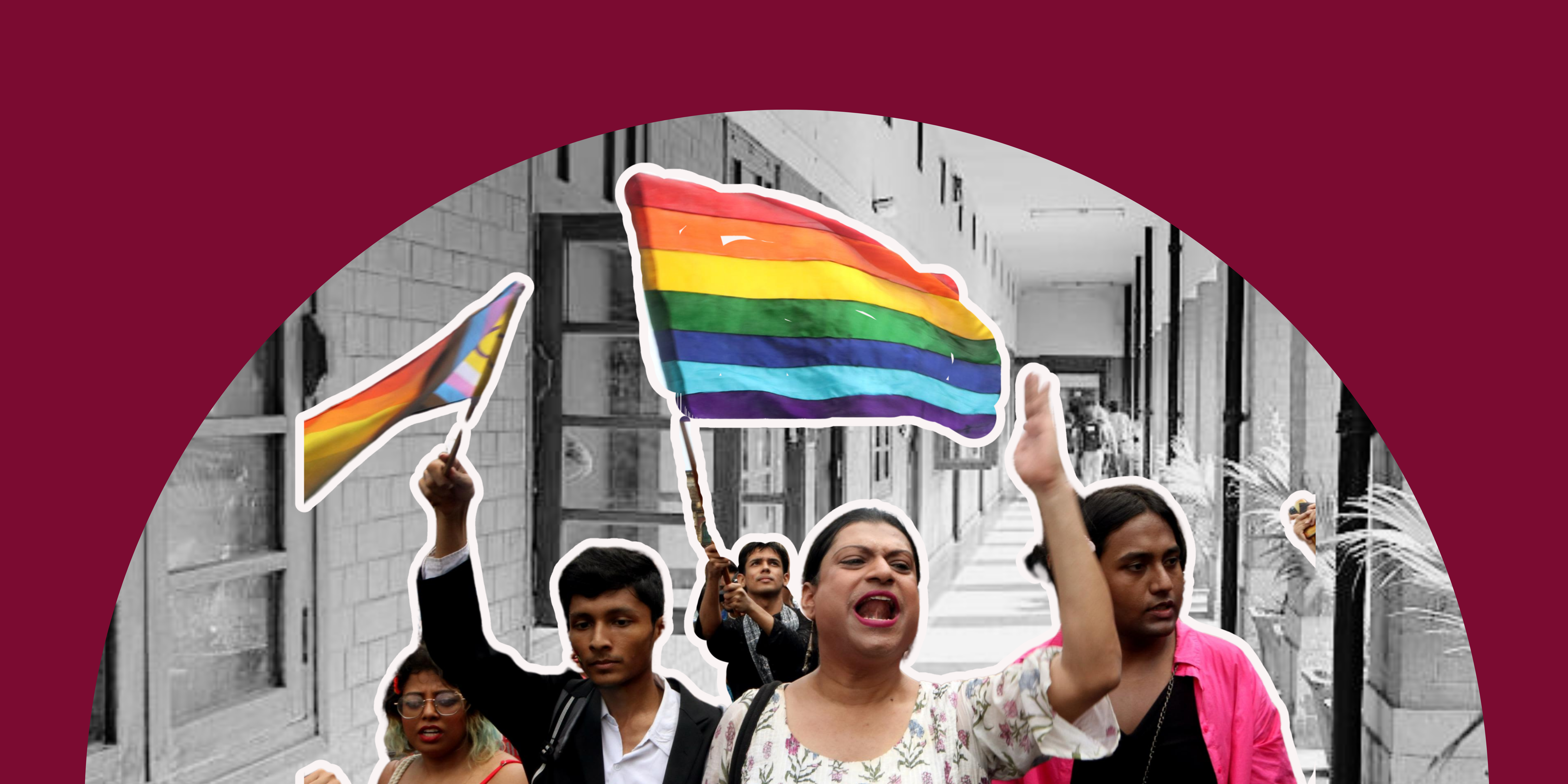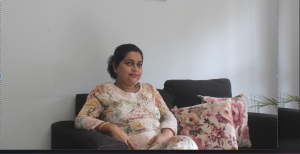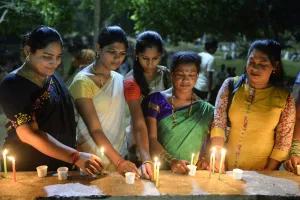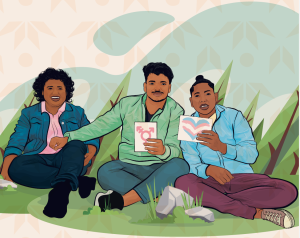Despite Laws, Guidelines, Queerphobia Remains Unchecked In Campuses
Students have reported frequent incidents of queerphobia and misogyny in universities. We look at why redressal mechanisms remain ineffective

TW: Mentions of sexual violence
In 2022, Abigail Irfan, a transgender woman student at St Joseph’s University (SJU), Bengaluru, was on her way back home from the campus when she was accosted by a group of unknown men and raped. Irfan, a science student from Kerala, was living in a rented accommodation close to the university.
Not wanting to approach the police, she immediately went to her college faculty for counsel and help. It took the faculty a week to respond. According to Irfan, the head of the mathematics department, John Binze, said to her: “You got raped because you look like a woman.”
Soon after, she dropped out.
This was not the only transphobic comment Irfan had to deal with. She was routinely “advised” by teachers to de-transition or was misgendered in class. When she tried to rejoin a year later, she said the registrar, Melwin Colaco, told her that this would be possible only if she lived by her “family’s rules”. Irfan said her family had abused her for being queer and trans, and had even sent her to conversion therapy. She had been rescued by her close friends and community organisations in 2022.
She was allowed to rejoin the university but still struggled to cope with her trauma and the hostility she faced on campus. Irfan dropped out again in 2023, in her final year. “My PTSD worsened, and I started getting hallucinations. I had gone through multiple hospitalisations during my time as a student which teachers found amusing,” said Irfan. She has not been able to complete her undergraduate degree since then and has been taking up research jobs to sustain herself.
Two years after that incident, on January 6, 2024 Irfan took to Twitter to share her ordeal. The post immediately went viral on social media. Several reached out to her, and shared their own experiences. Among them was Arsha Anilkumar, who graduated with a Master’s in Social Work last year from SJU. She had filed an official complaint to the university on February 20, 2023, alleging that she faced misogyny and queerphobia in the campus during her time in the university.
For 309 days, the university did not respond and it was only after she too put up a now viral Instagram post about her own experiences, that it finally stepped up. The university claimed that it had in fact investigated Anilkumar’s concerns and constituted an inquiry through its Gender Sensitisation Cell (GSC) which is meant to ensure a safe environment for all genders. The GSC said the concerned professors were “strongly discouraged from bringing personal beliefs into the classroom,” stated their email to Anilkumar. But no other action was taken against the professors.
There are two ways in which survivors of transphobic harassment can seek redressal: through the the Internal Complaints Committee (ICC) set up under the Sexual Harassment of Women At Workplace (Prevention, Prohibition, Redressal) Act, 2013 (the POSH Act) and also mandated by the University Grants Commission guidelines. They can also cite the Transgender (Protection of Persons) Act, 2019, which penalises people who harm, injure or endanger the life, safety, health or well-being whether mental or physical of a transgender person with a fine and a maximum of two years of imprisonment.
Experts say that queerphobic and transphobic behaviour is tantamount to sexual harassment because it reinforces harmful stereotypes against them, as well as creates a hostile learning environment for them. These are experiences that both Irfan and Anilkumar suffered. These incidents reported from SUJ are not isolated. There have been multiple instances of homophobia and transphobia reported from Indian campuses. Of the 1700 students surveyed across Indian colleges, at least 64% of students from the LGBTQIA+ community in India have faced discrimination or ridicule during their college years, concluded a 2021 study by the Boston Consulting Group, IIM Ahmedabad and Pride Circle Foundation.
Our interviews with survivors and activists show that cases of transphobia are rampant at universities. The reason they go unpunished is because students say they are either unaware of the laws and guidelines that protect them or fear that the authorities would punish them for complaining.
Last month, Jhatkaa.org, a nonprofit organisation working on digital advocacy, initiated a petition in support of the survivors of transphobic harassment. It has garnered around 1770 signatures.
‘We Feared Retribution’
Last year, Hritik Laxman Lalan, a Dalit trans woman student at the HCU and a member of the Ambedkar Students Association (ASA), had reported facing transphobic comments and abuse by a few students living in the university’s hostels, including women members of the right-wing student body, the Akhil Bharatiya Vidyarthi Parishad (ABVP). She said she approached the GSCASH immediately but has yet to get a response. Lalan served as the post-graduate student representative at the GSCASH-ICC last year.
Last Saturday, clothes belonging to Lalan and another ASA member were burnt in their hostel, as per an Instagram post by the ASA. But neither want to approach the GSCASH and instead plan to take the matter up to the VC. “This is not just an instance of gender violence, but caste violence and ragging as well,” said Lalan.
Transgender students have been allotted rooms in a guest house that is part of the men’s hostel complex despite union demands for separate living units. “We want the university to also identify certain places where transgender students can safely live within the university,” said Prajwal Gaikwad, a member of ASA.
The UGC guidelines state that all higher educational institutions are required to hold workshops, training sessions, sensitisation drives on gender issues, sexual harassment laws, awareness about what constitutes sexual harassment and hostile environments to teachers, students, admin staff etc. They are also required to publicly notify students about the provisions against sexual harassment. In 2016, the UGC guidelines expanded their ambit of those aggrieved to include transgender people.
Irfan and Anilkumar said the university never introduced its students to its ICC. Their questions about gender policies were dismissed by professors. Teachers were given to making tired sexist cliches like: “Women should keep themselves pure.”
Anilkumar said she was vocal about feminist politics in class and this often elicited hostile comments from the professors. “Which is why I waited till I graduated to write to them so that they could not harass me further,” said Anilkumar.
Students were also confused about what exactly constitutes sexual harassment.
“What I faced wasn’t harassment of a sexual nature but I felt bullied by my teachers who were not sensitised on gender issues,” said Anna Mariam, an SJU alumnus who also faced similar prejudicial behaviour from a few of her teachers.
Section 2 (k), lays down a list of instances that qualify as sexual harassment including “creating an intimidating, offensive or hostile learning environment”, and “humiliating treatment likely to affect health, safety, dignity or physical integrity of the person concerned”. The university, if it is aware of such instances, is supposed to “curb and prevent sexual harassment on campus”.
While the university boasts of an ICC, a Gender Sensitisation Cell, as well as an Anti-Sexual Harassment Committee – none worked for those who needed it and when they needed it.
Misogyny, Homophobia
Anilkumar alleged that in her first year of Master’s degree, Rama Gokula Krishnan, who teaches in the department of social work, “forced” his students to attend the screening of the documentary, Martyrs of Marriage. The movie, directed by documentary filmmaker and men’s rights activist Deepika Narayan Bhardwaj, revolves around the story of men who have been stuck with false cases of domestic violence. The movie, Anilkumar noted, painted a partial narrative about women misusing IPC 498A, India’s anti-dowry law.
“As social work students, we look at all narratives critically. This film did not talk about everyday, structural violence against women. I could overhear men around me whispering: ‘These women exploit us so much’,” she said.
Her critique of the film, she alleged, infuriated Kumar and he took to bullying her.
“He would say things like, ‘gender is not a big issue’ or ‘there are more important things to discuss like poverty, corruption’. Whenever I tried to speak about gender or feminism, he would say: ‘You shut up. You feminists ruin the world’.”
Professors were also openly homophobic, alleged Anilkumar. When she was in her first semester, she remembers one of the teachers saying during a lecture, “Homosexuality is a sin. It’s a medical condition that can be cured with treatment.” Anilkumar, who herself identifies as queer student, said she was deeply shaken after this incident.
Irfan recalled that she had to use the men’s washroom at SJU because it was forbidden for transgender students who had not undergone surgical transition to use the washroom of their preferred gender.
In 2022, Anilkumar was also a fighting a case of sexual harassment by a Kochi tattoo artists who had been accused of sexually assaulting multiple women. This necessitated frequent visits to Kochi. Once, while discussing her future plans with her professors she had said she was keen to do another Masters, in Gender Studies. The professor shot back: “So that you can go around filing cases against people?”
Measures For Trans Students
The Transgender Persons (Protections of Rights) Act, 2019, as we said, penalises anyone who harms, injures or endangers the life, safety, health or well-being of a transgender person with a fine and a maximum of two years of imprisonment. This, said Aruvi, 28, an ex-student of the Hyderabad Central University (HCU) and a transgender person, has important implications.
“Offences that carry a penalty of over three years are cognisable and the police, having the knowledge that an offence has occured, can file an FIR and also make arrests without a warrant. But because offences against trans persons are non-cognisable, we will have to convince the police to file one, which is a difficult task,” said Aruvi.
The Trans Act also mandates the establishment of a grievance redressal mechanism in every establishment, including universities for transgender people, said Kanmani Ray, a trans advocate. This mechanism involves nominating a designated complaint officer who is responsible for guiding transgender people with complaints relating to violations of the provisions of this Act.
We have written to SJU to check if they have such mechanisms in place. This article will be updated when we hear from them.
Such a redressal mechanism used to exist in Hyderabad Central University (HCU) although defunct now, said Aruvi. “The committee met twice to discuss the creation of gender neutral facilities on campus. But since the registrar — supposed to be one of the members of the committee without whose decision nothing could move forward — was absent in both the meetings, nothing much came out of it. We had to disband because I don’t know what we were doing, three of us agreeing with each other when there is no route for redressal,” said Aruvi.
What if a university does not comply with these mechanisms? The Trans Act does not specify any penalty but the UGC guidelines do: in the event of non-compliance, the commission can withhold grants to the university, remove its name from its list of colleges, among other actions. However, no such action has ever been taken against a university in the past.
Trouble With ICCs
Shalom Gauri was an undergraduate student at SJU from 2016-2019. During her time as a student, she had no idea about the grievance redressal mechanism available to students to address sexual harassment complaints. She reached out to Alternative Law Forum, a platform that provides legal services, to conduct a workshop on this. Of the 30-odd people who showed, few had ever heard of the ICC or UGC guidelines.
“That was the starting point of our collective movement to understand what was going on across colleges in Bangalore. So in 2018, we started surveying students; we got almost 230 responses from 20 colleges,” said Gauri. This is what she found – only half the students knew about ICC and of them half had little to no knowledge of how it can be contacted.
Despite a UGC notification, many educational institutions across India still do not have functional ICCs. In Hyderabad alone, there are 487 colleges, but barring a few, none have ICCs.
The college ICCs are also required to furnish an annual report with the number of cases that they received in an academic year. For the year 2022-23, UGC has reported that ICCs in universities across India received zero cases, a drop of 100% from previous year’s total reported cases that stood at 103. Despite the constitution of ICCs, there is little guarantee that it will operate in a non-partisan manner since members of this body are nominated by the principal or head of the department, and not elected.
In recent news, student-led movements for gender justice within university campuses in EFLU and BHU-IIT have been demanding the constitution of a GSCASH instead of an ICC, as BehanBox reported earlier. GSCASH or Gender Sensitisation Cell Against Sexual Harassment, were one of the first autonomous, anti-sexual harassment committees set up in universities after the Vishakha Guidelines came into effect in 1997. In 1999, JNU became the first educational institute in India to set up an anti-sexual harassment committee which was largely autonomous and became a model for other institutions.
However, the Vishaka Guidelines were later replaced by the POSH Act, making it mandatory for all workplaces to have an ICC.
All universities with autonomous sexual harassment committees have gone back to the ICC model. The loss in this switch has been the autonomous and democratic character of the GSCASH that elected its representatives from across student unions, teachers unions, and worker unions. Currently HCU remains one of the only universities that has a combination of both, a GSCASH-ICC, which has retained much of its democratic structure.
Speaking Out, Networking
It has, however, only been possible because of a rising student movement in the university led by several left and progressive student outfits. Lalan claimed that when served as the postgraduate student representative in the GSCASH-ICC panel last year, the cases reported rose.
What needs to be done to deal with on-campus transphobia? Anilkumar said the universities must ensure that student’s are made aware of the options available for dealing with gender violence. Transgender activist Aruvi suggested creating accessible legal pathways for affected students and facilitating queer collectives. (Irfan said she tried creating a network but it fell through due to the lack of institutional support.)
The National Academy of Legal Studies and Research (NALSAR) in Hyderabad started its queer collective in 2020. The queer collective has been instrumental in mobilising students in demanding a gender-neutral campus making it India’s first educational gender-neutral institute with gender-neutral washrooms and rooms.
We believe everyone deserves equal access to accurate news. Support from our readers enables us to keep our journalism open and free for everyone, all over the world.




